- Home
- Tony Roberts
Casca 32: The Anzac
Casca 32: The Anzac Read online
This is a book of fiction. All the names, characters and events portrayed in this book are Fictional and any resemblance to real people and incidents are purely coincidental.
CASCA: #32 The Anzac
Casca Ebooks are published by arrangement with the copyright holder
Copyright © 2010 by Tony Roberts
Cover design by Greg Brantley
All Rights Reserved
Casca eBooks are for personal use of the original buyer only. All Casca eBooks are exclusive property of the publisher and/or the authors and are protected by copyright and other intellectual property laws. You may not modify, transmit, publish, participate in the transfer or sale of, reproduce, create derivative works from, distribute, perform, display, or in any way exploit, any of the content of our eBooks, in whole or in part. eBooks are NOT returnable.
Table of Contents
PROLOGUE
CHAPTER ONE
CHAPTER TWO
CHAPTER THREE
CHAPTER FOUR
CHAPTER FIVE
CHAPTER SIX
CHAPTER SEVEN
CHAPTER EIGHT
CHAPTER NINE
CHAPTER TEN
CHAPTER ELEVEN
CHAPTER TWELVE
CHAPTER THIRTEEN
CHAPTER FOURTEEN
CHAPTER FIFTEEN
CHAPTER SIXTEEN
CHAPTER SEVENTEEN
CHAPTER EIGHTEEN
CHAPTER NINETEEN
Continuing Casca’s adventures, book 34 Devil’s Horseman
PROLOGUE
Burning pain. Deep, searing, burning pain. Casca lay mercifully unconscious on the ship’s bunk, swathed in bandages. But even though he wasn’t conscious, his body hurt, and the raw nerve-ends transmitted their distress to his brain. As he slept, he dreamed the pain.
He was standing in the trench in Flanders. He couldn’t move. His Lee Enfield .303 rifle was jammed. Frantically he worked the bolt action to free the round that was jamming the rifle and preventing him from shooting the figure advancing on him, carrying the dreaded flamethrower. Flames licked lazily from the evil, black muzzle of the weapon, and the carrier, a man in German army uniform got closer and then smiled.
Casca screamed. It was Rasheed, the vizier to King Shapur II of Persia. It couldn’t be Rasheed, Casca knew at the back of his mind, but here he was, fifteen centuries after his death, pointing the modern weapon at him. “Farewell, Spawn of Satan,” Rasheed breathed, his voice full of menace and glee.
“Noooo!” Casca yelled.
It was no good. The flamethrower burst into life, drenching Casca in the burning liquid and he saw his uniform burn. His hands rose in futile defense in front of him and he saw these, too, blacken and shrivel. The flesh was stripped away and only burning skeletal claws remained, smothered in fire. Casca uttered one long shriek of terror. And then the nightmare ended and only the pain remained.
He was still out of it, lying in the sick bay of HMS Abyrton, the British ship that had picked him up from the North Sea a few days ago. Two men tended the occupants of the sick bay, a doctor and his assistant. They concentrated on the two others who were suffering from a broken arm and a bout of ‘flu. These were treatable and the soldiers would recover to help fight the enemy. The man covered in bandages was either going to die or he wasn’t; if he died, he’d be thrown overboard. If he survived he wouldn’t be fit for anything and would be offloaded in Egypt where the ship was going and left for the medical people there to take care of.
Doctor George Dagger was weary. Large, bull-necked, most of his head smooth and shiny, with only the sides and back of his head covered in greying hair. The war had interrupted a comfortable medical practice in Somerset. Tending bunions and colds in the village of Bishop Sutton was all he wanted – and indeed could cope with. But he’d hidden his incompetence and inability in twenty years of bluster and bullshit. So the call to tend the wounded heroes of the army had come and he’d been volunteered by his colleagues in the region as the best.
Dagger would have preferred to carry on in his little practice, screwing the sensuous Lydia Morgan, the vicar’s wife, each time she came complaining of a myriad of imaginary ailments. Funny how a weekly dose of Mr Sausage cured her problems. But here he was in a place he detested; treating things he had no idea of how to cure.
Lucky for him he had a capable assistant, a twenty-two year old short, dark and very Welsh man by the name of Ieaun Clark. Clark wore small lensed spectacles and peered hard at whoever – or whatever – he was focused on. Although he was short, he possessed a large head and this gave him the appearance of being a dwarf, something he was not.
At this particular moment Clark was examining the figure of Casca. “Doctor,” he said in his rapid, sing-song accent that spoke of the valleys of South Wales, “this patient appears to be stabilizing.”
“When you say ‘stabilizing’,” Dagger said heavily, as if the weight of the world was on his shoulders, “what exactly do you mean?”
Clark peered closely at the falling and rising chest of the man lying on the bunk, strapped in to prevent him from falling out of the bed during the crossing through the rough seas of the Bay of Biscay. His lower jaw jutted out and his teeth showed in a grimace that he normally exhibited when deep in thought. “His breathing is much stronger than when I last checked him yesterday. I swear he’s twice as strong as before.”
Dagger sighed and waddled over to stand alongside Clark. He looked down at the prone figure, a mass of white bandages. “I don’t think he’s any better than yesterday. I wouldn’t be at all surprised if we had to dump him at sea before we pass Gibraltar.”
“But Doctor, I’m certain....”
“If he sits up and tells you he’s better, then let me know. Otherwise I wouldn’t waste your time on him. He’s better off dead. Want him to live after what’s happened to him?”
Clark remained silent but kept on peering down at Casca. The identity tags on him had been unreadable, having been almost melted in the horrific attack and any identification that may have been with him had been lost when the ship he’d been on had been torpedoed. Who this mystery man was, nobody knew. “Yes Doctor,” Clark said softly, utterly convinced he was right and the rotund Dagger wrong.
And he was right.
CHAPTER ONE
Alexandria harbor was a confused mess of men, animals, cargo and ships. Shouts in a variety of tongues competed with the screech of tortured wood as crates and packaging were unloaded onto the already overfull jetties. Ships’ horns boomed as vessels came and went, their occupants shouting at each other as they strove to offload their cargoes or pick up men, equipment and supplies. Like all ports the world over, it had the smells particular to one; the salty tang of the sea, rotting fish, tar from ships that lay alongside the jetties and the waft of spices from packages that had been hauled from the bellies of the wallowing merchantmen.
March in Egypt meant warm air rather than unbearably hot, and the stevedores and hired hands could work longer as a result. Their efforts were necessary, for the British Empire needed men and supplies for the planned attack on the Ottoman Empire to the north; Churchill’s grand plan to knock the Sublime Porte out of the war and relieve the hard-pressed Russians from the attentions of both Germany and Austria-Hungary by supplying them via the Dardanelles.
Casca was deposited on the jetty with a bump. He groaned. Consciousness was more and more frequent, and he tried hard to remember where he was and who he was. Changing his name throughout his life was all very well, but on the occasions he became disorientated he had trouble remembering who exactly he was supposed to be. The first thing he had to cope with was that he was tied down. He couldn’t see anything because something was covering his face, but he cou
ld breathe.
But the worst thing was the pain. His whole upper body was a mass of throbbing, searing nerve-ends. It was unbearable. His mind searched through his long sequence of experiences to recall just when he felt such pain before, and one kept on returning to him. Burning. That horrible experience in Persia way back in the time of the Caesars.
Rufus Casterton. The name popped into his mind. That’s who he was. An American in the British army. He was supposed to be dead. Best it was left that way. Time to invent a new identity. He hissed in pain.
“Steady, old boy,” a soft, caring voice came to him from close by.
Casca felt himself being picked up suddenly. He must be on some sort of stretcher, or so he thought. He was moved past sounds of men speaking Arabic and English, and the smells of sweat and the sea came to him. The air was warm, a welcome change to the freezing cold of Flanders in the winter. More and more memories were slipping into place. He knew most of what was important now. He’d been doused in flames in a trench. That was the last he remembered, apart from some nightmares.
He groaned again and someone shouted ahead of him in very loud and clear English. “Make way! Stretcher detail.”
The accent was familiar. Welsh. He’d spent a few months in South Wales recently, mining coal from underground, and the accent had become well known to him. The carriers weren’t too careful, though, and Casca felt himself being bumped and jostled. It was excruciating. He couldn’t help but cry out or groan.
Whoever the Welshman was must have heard him over the babble of Arab voices, for he suddenly cut through the background noise. “Be careful with him! He’s a very sick man and I want him alive when we get to the hospital!”
Casca found it difficult to orientate himself. He was definitely in North Africa; the memories of being in this part of the world before came to him. He had been in French North Africa less than a hundred years ago when he was serving with the Foreign Legion, but this was British North Africa. Egypt. This was a port, the smells were unmistakable. It had to be either Port Said or Alexandria.
The question came to him; why Egypt? He would surely have been on a ship bound for England from France. So why was he here? More importantly, when was it? The sounds of clipped English military orders being barked out came to him. How was the war going? Was it still going? Who was winning – or who had won?
After five minutes the boots of the stretcher bearers began crunching on firmer ground and Casca picked up more of the Welshman’s voice, and the Arabic ones faded into the background. “Where’s the doctor?”
“First door on the left. What you got there?” came a second voice.
“Severe burn case. Picked him up in the English Channel. His ship had been sunk.”
“Bloody hell,” the second man gasped, “he’s one lucky sod.”
“Thinking he’s indestructible,” the Welshman said, then suddenly the sun was gone and the echoes of walking inside a building came to Casca.
Ship sunk? Casca’s mind stayed with that thought. All my past links with my former unit have gone. It would be easier for him to invent a new identity. Unless, of course, his identity tags were still with him. He couldn’t check on that because he was immobile and unable to see.
The stretcher suddenly dropped and he was bumped none too gently on the floor. He groaned in pain.
“You stupid bastards,” the Welshman snapped, “go careful with him! Ah, get out you bloody useless buggers.” The sound of two pairs of feet stomping out was followed by a moment’s silence. Casca strained to hear, but could only discern vague movements.
“Hey,” he croaked through the gauze. His voice was muffled. “Need water.”
“Steady on, old boy,” Welshman said soothingly. “We’ll get you a drink.”
“So what have we here?” a deeper voice suddenly cut in. This was an Englishman, authoritative, confident. “Burn case? Who are you?”
“Clark, Assistant Medical Orderly, HMS Abyrton. Picked this fellah up en route from Southampton. No idea who he is. Should’ve died but he’s pulled through. Flamethrower attack, from what we know, judging by the injuries and burns.”
“Hmmm” the second voice said. “Let’s get these bandages off and see.”
Casca held his breath as the bandages were cut slowly and gently. He squeezed his eyes shut and waited. The pain increased and he sucked in his breath. Then, suddenly, he felt all pressure on his face lift and he blinked, trying to see where he was. Thankfully light came to him and there was a wave of relief. His eyesight wasn’t gone. There again, the Curse surely wouldn’t have allowed it to be destroyed. It took a few seconds to focus, then two figures came into focus. A short, dark-haired man with glasses and a larger, white-coated man with a bulbous nose and mustache. This must be the doctor.
“Well, young man, you’re one lucky soldier.”
Casca blinked again at the doctor. “Yes, Doc.”
The two men looked at him in surprise. “You’re not English?” the doctor asked.
Casca cleared his throat. He would have to be careful. He had been an American in the army, and there wouldn’t be too many of those. That would be easy to track. He’d been around the British Empire sufficiently in the last century or so to pick up the various accents. “Nah, Doc. South African.”
“Name?”
“Klaus van der Laang.” He used his Boer name he’d adopted when he’d been there, about eighty years previously. There would be no link as no papers had ever been made for him, and it was an invented name. They could check the name until the cows came home and never find it.
“So how come you were in Flanders?” the other man, Clark, asked. His tone was faintly sceptical. “Long way from the Cape.”
“I’m from Natal. Joined up in August ’14. Wanted to join in the fun, only it was a damned bloody mess. Glad to be out of it.” He rolled his ‘r’s’ and lengthened the vowels.
“Well,” the doctor said, staring at him, “you don’t look to be in too bad a shape, for someone who’s been burned recently and immersed in the English Channel.”
“No, you don’t,” Clark added, a thoughtful look on his face. “I swear you were little more than charcoal when I first bandaged you on board.”
“Plenty of that came away with the bandages,” the doctor added, looking at the metal bowl in his hand. “But you’ve got plenty of fresh clean skin showing. What on earth happened?”
“Doc?” Casca asked, his heart pounding. He wanted to say well, you won’t believe this but I was cursed at Golgotha by Jesus and I sort of can’t die. You believe me, don’t you? He didn’t care for the way the two men were looking at him.
“Let’s get you a bed and cleaned up. Then some painkillers and water. Then rest.”
Casca shut his eyes. He knew the questions would get more searching the longer he remained here and his body healed at the phenomenal rate it always did. He wouldn’t be allowed to go free. They’d have medical ‘experts’ crawling all over him like flies on shit. If one thing life had taught him, it was that an ‘expert’ was nothing of the sort and knew damn-all about the subject he or she was an ‘expert’ in.
He’d have to get out fast.
Clark tapped his fingers on the side of the table he was standing by. “Doctor, I’d like to be kept informed as to this man’s progress. I can bring you the medical log that shows this man was nearly dead when we picked him up two weeks ago. He shouldn’t be this healthy. I mean, he could be on his feet in a week or so!”
The doctor looked thoughtful. “If you could, Clark, that would be helpful. There must have been some mistake in the original examination. Who carried it out?”
“Doctor Dagger on board ship.”
“Is he likely to have made a mistake?”
Clark hesitated; yes, to be honest, he was. But he himself had seen the state of van der Laang or whatever his name was when he’d been bandaged up on board. It was nothing like this. “I don’t think he would have made this sort of error,” was what he said.
The doctor made a noise and dismissed Clark. He then arranged for Casca to be carried to a bed where he was fully examined and redressed. A drink was provided which helped slake this thirst but also contained something that made him drowsy, and dulled the pain. As he slipped towards unconsciousness, he looked sideways out of the window and thought he caught sight of Clark looking in.
It disturbed him, but he couldn’t be sure, then sleep claimed him.
CHAPTER TWO
It was night when Casca came round. At first he was disorientated with the darkness, but then the faint light of the moon came to him through the window and he relaxed. The vague vision of Clark looking at him through the window persisted, though, and he stared at the window again, but there was nothing outside. There was a small courtyard and then a high wall, possibly the back of another building.
The room he was in was a communal one, and four other beds were occupied. From the faint light he thought they were all bandaged up like he, but he wasn’t certain. He threw back the thin sheet that had been covering him and he gingerly put his feet on the cool surface of the floor. He was a little unsteady and weak, but that was due to him being off his feet for a couple of weeks; the body wasn’t used to it.
The painkiller’s effects had worn off too. His upper chest and face burned with agony. His nerve ends were raw and screaming out their protest. It would be that way for a little while yet. He had to see what he looked like. He used the wall to get along the room, and the other beds when he got to them. One occupant was awake and complained querulously when Casca leaned on his bed frame. “Shut up,” Casca snapped, irritated, “or I’ll make you really ill.”
“Can’t a sick man sleep in peace?”
“You want peace?” Casca hissed, keeping his voice low in case anyone on duty heard and came investigating. “Then go back to sleep and let me on my way!”
The man rolled over mumbling and Casca moved on, thankful the idiot had done so. There was a low light showing through the door at the far end of the ward and he peered through the glass pane and saw a corridor. Nobody was moving. The door opened but the handle rattled slightly. Cursing, Casca glided out into the passageway and looked left and right. Someone was talking off to the left, where the light was coming from, so he went right.

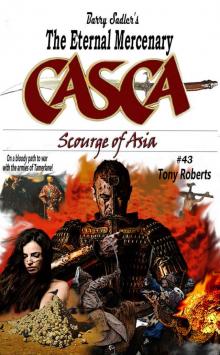 Casca 43: Scourge of Asia
Casca 43: Scourge of Asia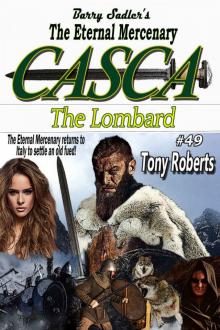 The Lombard
The Lombard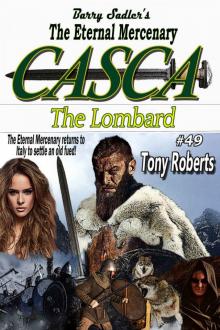 Casca 49: The Lombard
Casca 49: The Lombard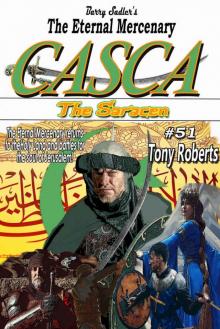 The Saracen
The Saracen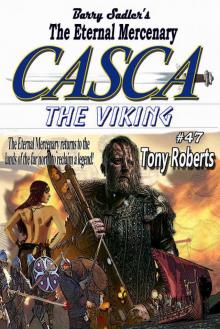 Casca 47: The Viking
Casca 47: The Viking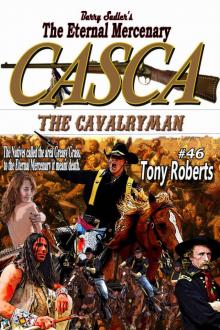 Casca 46: The Cavalryman
Casca 46: The Cavalryman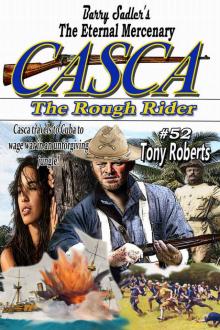 Casca 52- the Rough Rider
Casca 52- the Rough Rider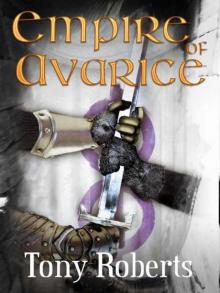 Empire of Avarice
Empire of Avarice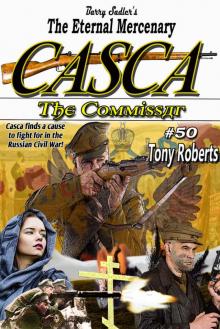 The Commissar
The Commissar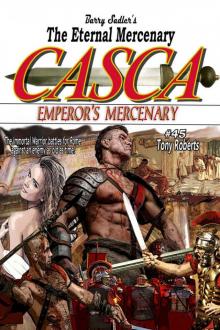 Casca 45: Emperor's Mercenary
Casca 45: Emperor's Mercenary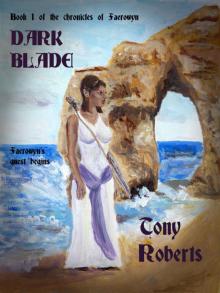 Dark Blade
Dark Blade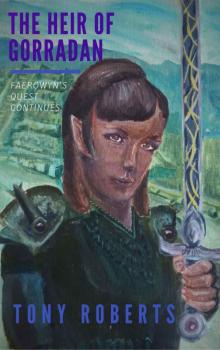 The Heir of Gorradan (Chronicles of Faerowyn Book 2)
The Heir of Gorradan (Chronicles of Faerowyn Book 2)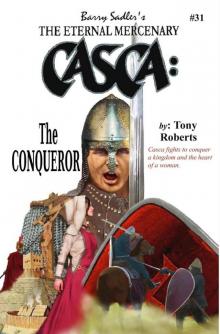 Casca 31: The Conqueror
Casca 31: The Conqueror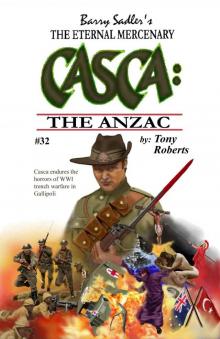 Casca 32: The Anzac
Casca 32: The Anzac The Anzac
The Anzac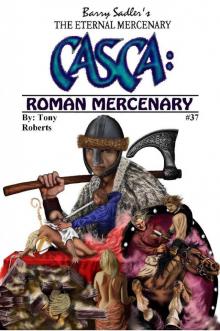 Casca 37: Roman Mercenary
Casca 37: Roman Mercenary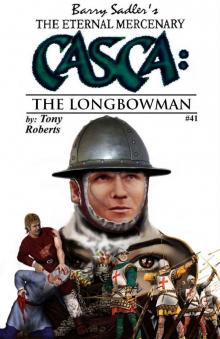 Casca 41: The Longbowman
Casca 41: The Longbowman The Longbowman
The Longbowman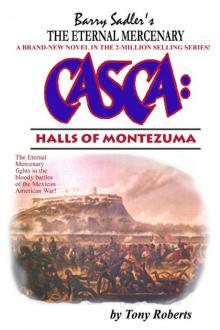 Casca 25: Halls of Montezuma
Casca 25: Halls of Montezuma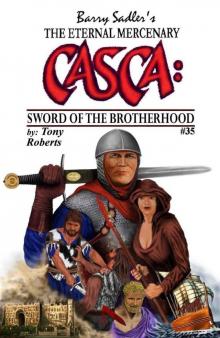 Sword of the Brotherhood
Sword of the Brotherhood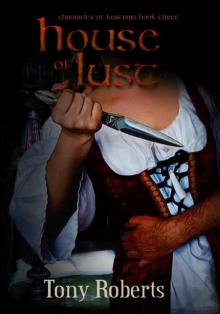 House of Lust
House of Lust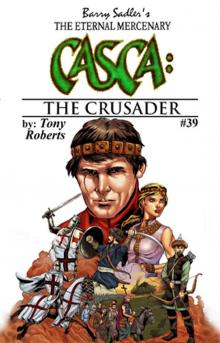 Casca 39 The Crusader
Casca 39 The Crusader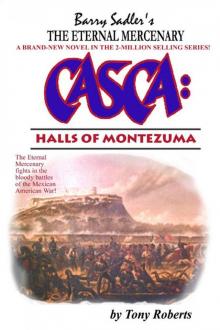 Halls of Montezuma
Halls of Montezuma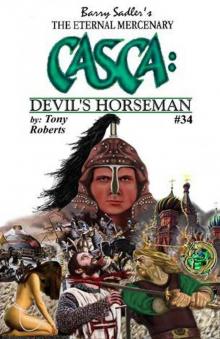 Devil's Horseman
Devil's Horseman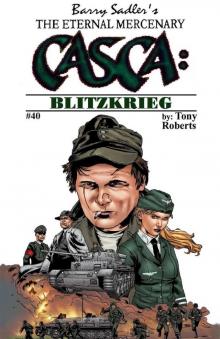 Casca 40: Blitzkrieg
Casca 40: Blitzkrieg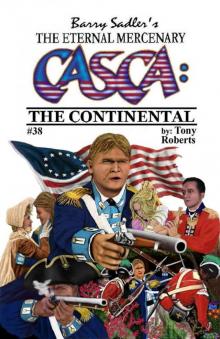 Casca 38: The Continental
Casca 38: The Continental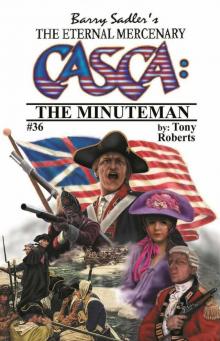 The Minuteman
The Minuteman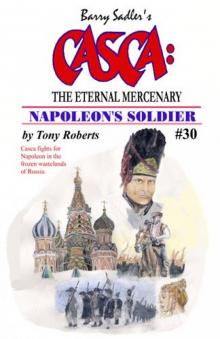 Napoleon's Soldier
Napoleon's Soldier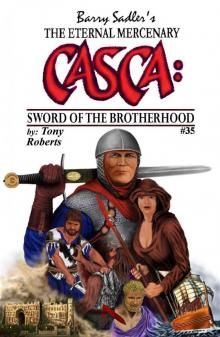 Casca 35: Sword of the Brotherhood
Casca 35: Sword of the Brotherhood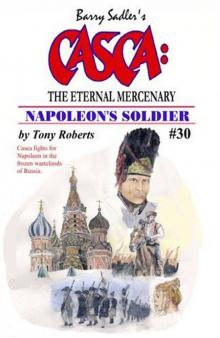 Casca 30: Napoleon's Soldier
Casca 30: Napoleon's Soldier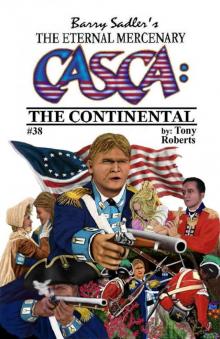 The Continental
The Continental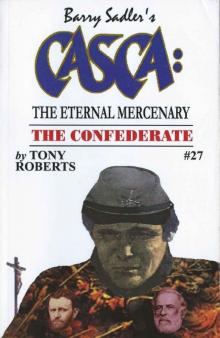 The Confederate
The Confederate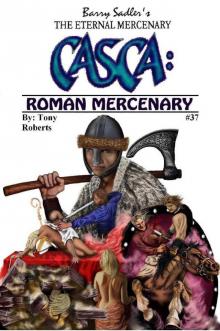 Roman Mercenary
Roman Mercenary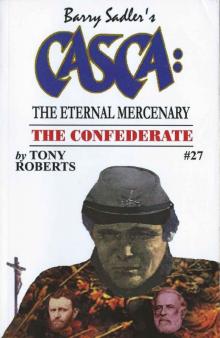 Casca 27: The Confederate
Casca 27: The Confederate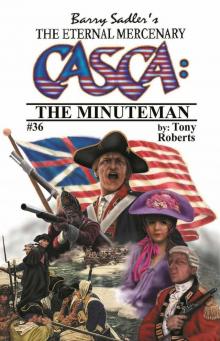 Casca 36: The Minuteman
Casca 36: The Minuteman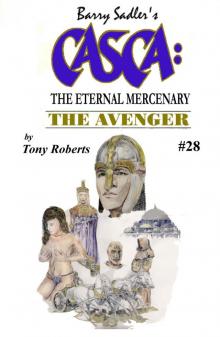 Casca 28: The Avenger
Casca 28: The Avenger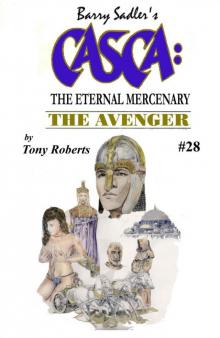 The Avenger
The Avenger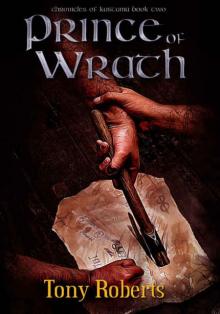 Prince of Wrath
Prince of Wrath